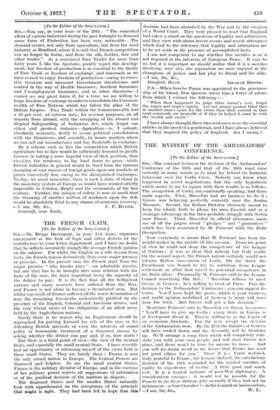THE FRENCH CLAIM.
[To the Editor of the SPECTATOR.] Sia,—Mr. Briggs Davenport, in your last issue, expresses amazement at the lack of logic and other defects of the contributors to your letter department, and I have no doubt that he reflects accurately enough the average French opinion on the subject. For whilst the English as a rule reason from facts, the French reason deductively from some major premise or principe. In the present case the French start from the major premise " who breaks pays "—an admirable maxim, but one that has to be brought into some relation with the facts of the case, the most important being the capacity of the debtor to pay. It is the fact that all the belligerent nations and many neutrals have suffered from the War, and France is not alone in having a devastated area. But whilst one-sixth of France suffered all the worst devastation of war, the remaining five-sixths undoubtedly profited by the presence of the English, Colonial and American armies, and the very liberal views of the obligations of an allied army held by the Anglo-Saxon nations.
Surely there is no reason why an Englishman should be reproached for putting forward his side of the case or for defending British interests or even the interests of sound policy or honourable treatment of a disarmed enemy by asking whether the debtor can pay and, if so, how much T
But there is a third point of view—the view of the neutral State, and especially the small neutral State. I have recently had an opportunity of informing myself of the views held in these small States. They are briefly these : France is now the only armed nation in Europe. The Central Powers are disarmed and helpless. So are the small neutral States. France is the military dictator of Europe, and in the exercise of her military power rejects all suggestions of arbitration or of the juridical decision of the matters in dispute.
The disarmed States and the smaller States naturally look with apprehension on the acceptance of the principle that might is right. They had been led to hope that this
doctrine had been abolished by the War and by the creation of a World Court. They were pleased to read that England had taken a stand on the questions of legality and arbitration,
and they view with alarm recent events and recent utterances which lead to the inference that legality and arbitration are to be set aside in the presence of accomplished facts.
I am not competent to say whether this sacrifice is or is not required in the interests of European Peace. It may be so, but it is important we should realize that it is a sacrifice involving, inter alia, the reputation we once enjoyed as the
P.S.—When Sancho Panza was appointed to the governor- ship of his island, Don Quixote wrote him a letter of advice from which I extract the following :- "When thou happenest to judge thine enemy's case, forget thy injury and respect equity. Let not proper passion blind thee in another man's cause for the errors thou shalt commit in that most commonly are incurable or if they be helped it must be with thy wealth and credit."
I have always thought these two sentences were the essential articles in the creed of a gentleman, and I have always believed that they inspired the policy of England. Am I wrong ?










































 Previous page
Previous page